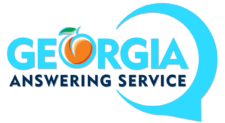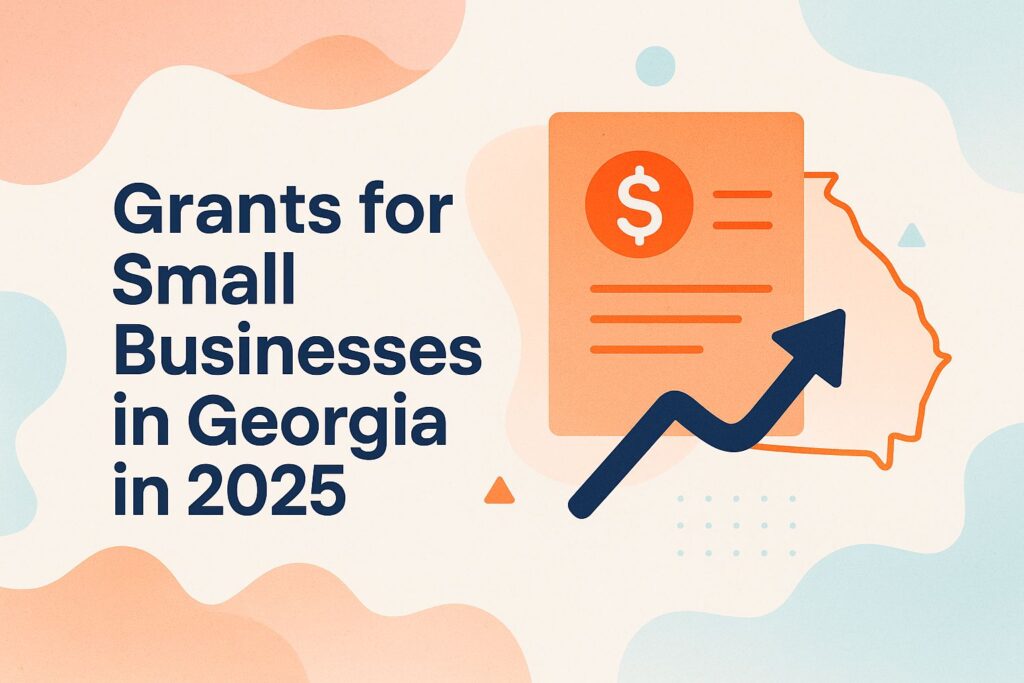
Grants for Small Businesses in Georgia in 2025
Finding funding options can significantly impact your small business in Georgia. As we near the end of 2025, it’s important to know about the grants you can access. From federal to local options, each grant holds unique potential to fuel your growth. Learn about the different types of grants, who can apply, and practical advice for writing a successful proposal. Learn about the financial help that can grow your business!
Importance of Grants for Small Businesses
Grants can pay for all project expenses, allowing businesses to create new ideas without taking on debt, providing important financial help.
Grants give money without needing to be paid back, unlike loans that come with interest and repayment. This makes grants appealing for small businesses and startups looking for cash flow solutions.
For instance, in Georgia alone, grants contributed to the creation of over 30,000 jobs in 2022, showcasing their economic impact. Programs like the Georgia Department of Economic Development’s Georgia Agribusiness Council grants support areas such as farming and technology, encouraging growth without financial burden.
Companies aiming to create new ideas can use this money to make operations better, hire more staff, and expand their products or services effectively.
Overview of 2025 Grant Landscape
In 2025, there will likely be more grants available in Georgia for businesses owned by minorities and women.
Initiatives include the Georgia Minority Business Support Program, anticipated to release grants ranging from $5,000 to $25,000, focusing on technology and agriculture sectors.
The U.S. Small Business Administration is also set to expand its Community Advantage program, targeting $50 million in funding directed toward underserved entrepreneurs, enhancing business growth potential.
To stay updated on funding opportunities, entrepreneurs should regularly check the Georgia Department of Economic Development’s website and subscribe to newsletters from local chambers of commerce. Engaging with community organizations can also help identify less-publicized funding opportunities.
Types of Grants Available
Businesses in Georgia can access a variety of grants from federal, state, local, and private sources, including government grants and nonprofit organizations.

Federal Grants
Federal grants, such as those from the Small Business Administration (SBA), provide substantial funding for startups and expanding businesses.
Among these, the SBA 7(a) Loan Program is highly popular, offering funding from $100,000 up to $10 million. Companies need to prove they can pay back loans and have a strong credit history.
The 504 Loan Program, which focuses on real estate and equipment, typically provides funding ranging from $50,000 to $5 million, requiring a down payment of around 10%. The application process generally includes submitting a business plan, financial statements, and tax returns.
Using the SBA’s online resources can make your process easier.
State Grants
The Georgia Department of Economic Development offers state grants specifically targeting job creation and community development.
These grants can provide funding amounts up to $500,000, aimed at initiatives like workforce training and infrastructure improvements, contributing to local economic development.
For instance, the program has successfully supported Qcells, a solar energy company, which received a $300,000 grant to expand its manufacturing facility in Dalton. This investment created 300 jobs in the local area and improved community involvement by working with local schools to develop the workforce.
Communities wanting to apply should make sure their projects match state economic goals.
Local Grants
Local grants from city governments and chambers of commerce support community-specific needs and initiatives.
Programs often provide funding ranging from $5,000 to $25,000, catering to various projects like community development, arts, and education, supporting business advocacy efforts.
For example, the City of Denver offers the Neighborhood Projects Fund, while the Chamber of Commerce in Austin runs the Small Business Grant Program.
Eligibility typically requires local residency, project alignment with community goals, and sometimes partnerships with local organizations.
Working with local nonprofits can improve your proposal by showing community backing and importance, which increases the chances of getting funding.
Private and Nonprofit Grants
Private foundations and nonprofit organizations offer grants that focus on innovation and community development.
Notable private grant opportunities include innovation grants and technology grants:
- The Gates Foundation’s Grand Challenges (average $100,000, focused on social innovations)
- The Packard Foundation (typically $50,000-$250,000, centering on children’s health)
- The Knight Foundation (grants around $10,000-$150,000, specializing in community engagement)
To find these grants successfully, use databases such as Foundation Center and GrantStation, attend local grant workshops, or connect with people in nonprofit groups. Regularly check their websites for updated funding initiatives that align with your objectives.
Eligibility Criteria
Knowing the eligibility criteria is important for getting grants, as it differs a lot between various grant types.
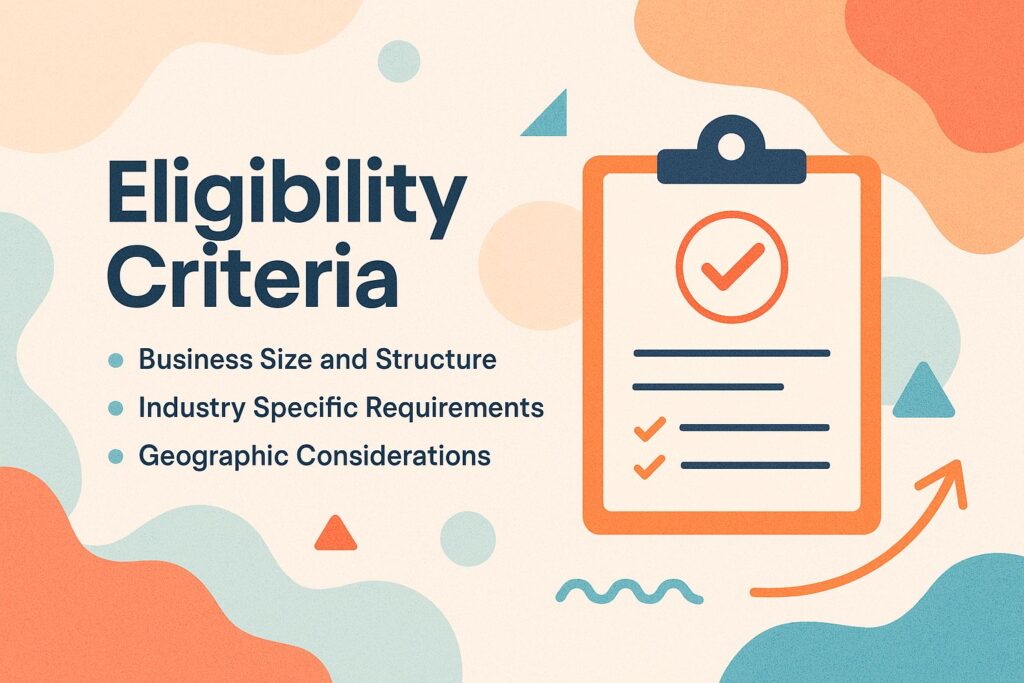
Business Size and Structure
Most grants define small businesses as those with fewer than 500 employees, but criteria may vary by program, impacting business scalability.
For instance, the Small Business Administration (SBA) often requires businesses to register as an LLC or corporation to qualify for their grants, focusing on liability protection and formal business structure.
In contrast, state-specific grants may allow sole proprietorships but come with additional reporting requirements. For example, California’s Small Business Grants mandate an annual revenue limit, while New York prioritizes businesses owned by underrepresented groups.
Always check the grant rules to make sure your business setup meets the qualifications.
Industry Specific Requirements
Some grants are designed for particular sectors like technology, healthcare, or farming, with their own specific requirements, representing industry trends.
For instance, the Small Business Innovation Research (SBIR) program supports tech and research initiatives, while the USDA offers grants to promote sustainability in agriculture.
Healthcare startups can tap into the National Institutes of Health (NIH) grants focused on medical research. To apply successfully, businesses should align their proposals with each grant’s mission, reflecting industry needs.
Use resources like Grants.gov or local economic development agencies to find relevant opportunities and get help with application processes.
Geographic Considerations
Many grants impose geographic restrictions, requiring businesses to operate within specific regions or municipalities.
For instance, the Rural Business Development Grant prioritizes applications from rural areas, focusing on improving economic viability in these regions.
In contrast, the Urban Development Action Grant targets cities, offering financial support for projects that better communities and encourage local participation.
Knowing these differences is important; a small business in a rural town might gain more from the first option, while a startup in a city should look into urban-focused grants.
Tools like Grants.gov can help identify opportunities catering to specific geographic needs by filtering based on location and funding type.
Application Process
Applying for a grant requires thorough planning and following set rules.
Preparing Required Documentation
Collecting essential papers, like business plans and financial statements, is important for applying for a grant successfully.
Along with your business plan and financial statements, add tax returns from the last three years, detailed financial forecasts, and resumes of important team members working on the project, ensuring compliance with reporting requirements.
Sort these documents into digital folders with clear labels. Tools like Google Drive or Dropbox help maintain accessibility and version control.
Before submitting, check each document to make sure they are complete and match the goals of the grant. This detailed preparation makes your application stronger and significantly improves your chances of getting funding.
Writing a Winning Grant Proposal
A strong grant proposal clearly explains the project goals, budget, and expected results to the funder, emphasizing policy initiatives and stakeholder collaboration.
To improve your proposal, state your project goals clearly. For example, if your project plans to improve literacy rates, state the percentage you expect to increase in two years.
Next, outline your budget, including detailed examples like:
- Staff salaries ($50,000)
- Materials ($15,000)
- Outreach programs ($10,000)
Use a clear format to present this information, such as a table or bullet points for readability. Highlight the anticipated results, like better involvement in community activities or higher levels of education.
Common mistakes are unclear goals or an uncertain budget, so be clear to prevent problems.
Submission Guidelines
Each grant has specific submission guidelines, including formats, deadlines, and required forms that must be strictly followed.
To maximize your chances of success, begin by downloading the grant’s application kit, often available on the funding organization’s website.
Pay close attention to format requirements, as many grants prefer PDF submissions, while others use online portals. Due dates can change a lot, so keep a calendar and set alerts a few weeks early.
For example, the National Endowment for the Arts typically has deadlines in February and July. Submitting early allows for any unforeseen delays and provides time for feedback before final submission.
Key Grant Programs in Georgia
Grant funding sources provide essential support for small businesses and entrepreneurship in Georgia, offering diverse opportunities for economic recovery and growth.
Georgia has important grant programs aimed at helping small businesses grow and supporting economic growth with a focus on business sustainability and business expansion.
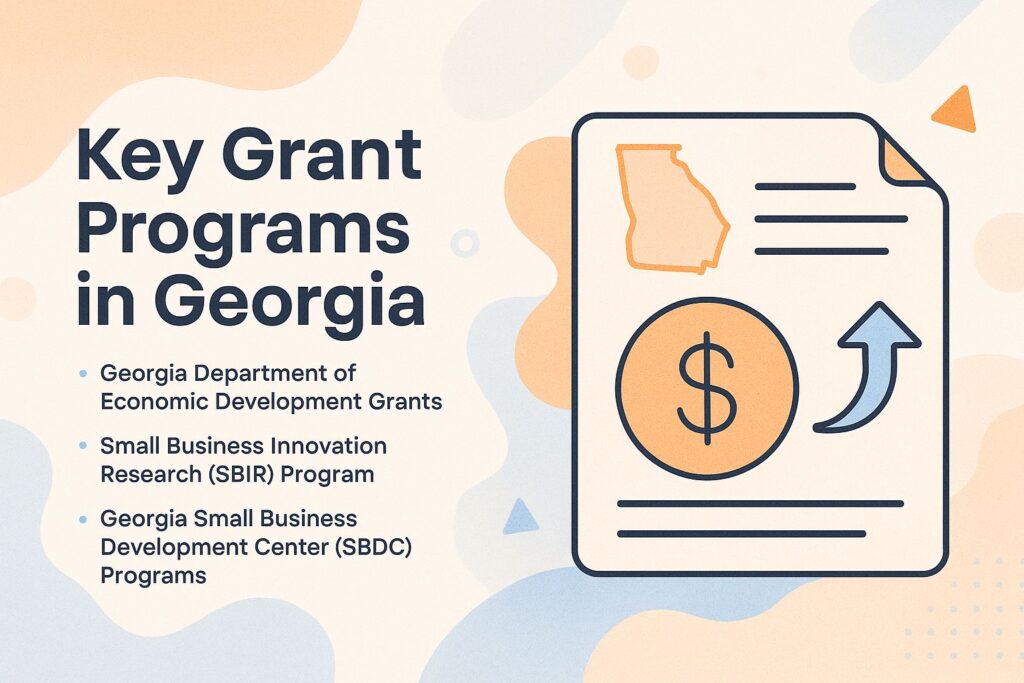
Georgia Department of Economic Development Grants
These grants are essential for supporting business outreach and industry-specific grants in rural development.
The Georgia Department of Economic Development offers different grants to help local economies grow and support new businesses.
Some notable programs include the OneGeorgia Authority grant, which offers up to $500,000 for rural development projects, focusing on job creation and infrastructure improvements. The Video Gaming Grant, funding up to $250,000, supports local businesses that promote tourism through gaming facilities.
Eligibility typically requires the business to demonstrate potential for economic impact and job creation. Past recipients have included:
- Community centers introducing recreational projects that strengthen business stability and support local economic benefits
- Tech startups expanding their workforce in underserved areas with the help of business incubators and access to capital
Small Business Innovation Research (SBIR) Program
This program plays a critical role in providing startup funding and facilitating grant proposals for innovative projects.
The SBIR program allocates over $2 billion annually to support small businesses engaging in research and development.
This program is divided into three phases.
- In Phase I, businesses can receive up to $150,000 to establish the feasibility of their ideas within a six-month period.
- Phase II grants increase funding to $1 million, focusing on R&D efforts that advance the project.
- Phase III encourages commercialization without direct SBIR funding but requires a solid business strategy and professional services for proposal writing tips.
Eligibility criteria include being a for-profit U.S. business with fewer than 500 employees, and the project must be innovative, addressing specific technological gaps.
Georgia Small Business Development Center (SBDC) Programs
The SBDC is a key source for small business resources and grant management, providing essential support services.
The SBDC offers grants and resources to help small businesses in Georgia with advice on funding and expansion.
With a focus on research and development, the SBDC provides programs to improve business skills, such as workshops on financial planning and marketing strategies.
Business owners can receive free consulting sessions for personalized advice. Resources like the Georgia Small Business Resource Guide are available to help them achieve success.
With help from the SBDC, many companies have changed how they operate. A local bakery received funding that allowed them to begin selling online, increasing their revenue by over 40% within a year.
Tips for Success
Effective grant utilization and maintaining a competitive advantage are key elements of success in securing funding.
Getting grants needs careful planning and effective use of community resources and connections.
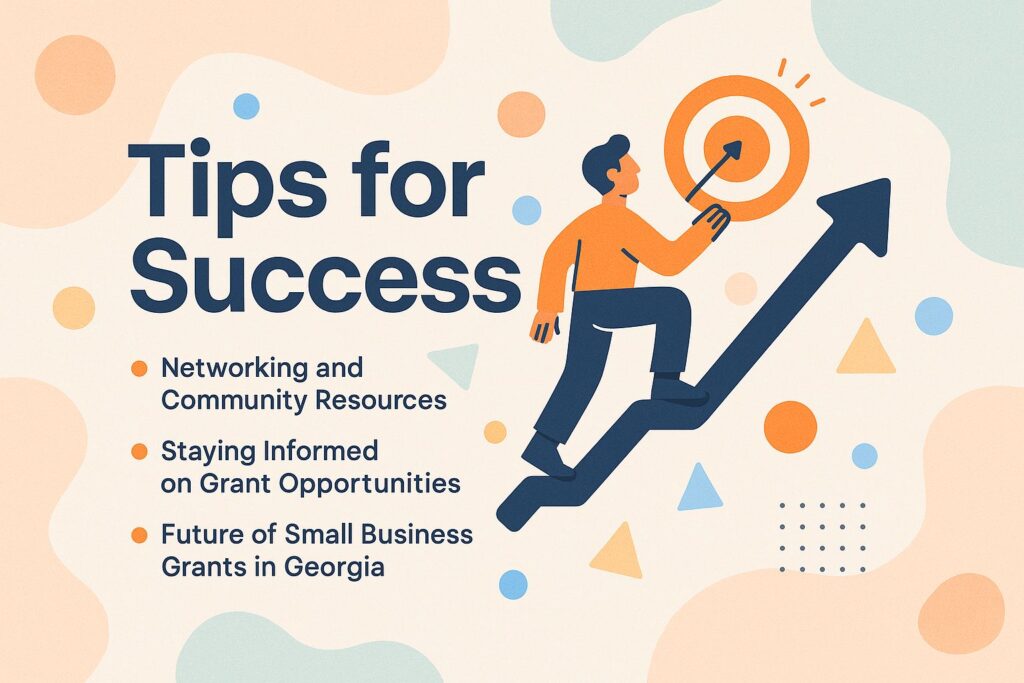
Networking and Community Resources
Networking is essential for finding business mentorship opportunities and accessing venture capital.
Creating good connections can help you find funding options and offer important information on how to apply for grants.
To improve your networking efforts, try these practical tips:
- Attend local workshops or industry conferences to meet potential collaborators;
- Become a member of your local chamber of commerce to find resources and events designed for businesses.
- Engage with online communities like LinkedIn groups relevant to your field.
For instance, participating in a workshop can lead to face-to-face discussions, while online groups provide ongoing support and knowledge sharing.
These connections help you be seen more and introduce you to new funding opportunities and effective grant writing techniques.
Staying Informed on Grant Opportunities
Keeping track of grant opportunities means you need to actively check for updates, use specific tools like grant databases, and be aware of when funding deadlines occur.
Consider using GrantWatch, starting at $20/month, which aggregates thousands of grants across different fields.
Another excellent resource is Foundation Directory Online, available for $49/month, providing detailed information on private funding sources.
Subscribe to newsletters from organizations like The Chronicle of Philanthropy or Foundation Center to receive regular updates.
Following relevant social media accounts can also help you catch emerging opportunities quickly.
By using these resources and methods, you can make your research process easier and improve your chances of getting funding.
Small Business Grants in Georgia: What’s Next
In Georgia, there are indications that small business grants will increasingly target technology and novel concepts. This seeks to address funding problems and provide grants specifically for businesses owned by minorities and women.
As economic resilience remains a focus, small business grants in Georgia are likely to expand in scope and accessibility.
A significant trend is the anticipated increase in funding directed toward technology and innovation. This can help minority and women-owned businesses get important resources needed for growth.
For instance, organizations like the Georgia Department of Economic Development are enhancing grant opportunities specifically for tech startups and innovative projects. Programs that focus on mentorship and capacity building will further support these enterprises.
Keeping up with local funding announcements and applying through platforms like Grants.gov can help businesses take advantage of these changes.
About the Author
I’m Kimberly Fischer, a University of Georgia graduate with a bachelor’s degree in Business Administration and the proud owner of a Georgia-based virtual answering service company. I’ve spent the last seven years helping businesses across Savannah, Macon, and Atlanta improve customer service and boost responsiveness with smart, professional call-handling solutions. I also write for Georgia Answering Service, where I share insights to help small businesses thrive.
